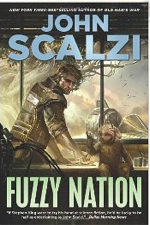by John Scalzi
 I’m going to touch on something that I’ve discussed briefly before but which I think is worth reheating into its own post. Here are the best selling books in the US from 1912, which is (for those of you for whom math is not a strong suit) 100 years ago.
I’m going to touch on something that I’ve discussed briefly before but which I think is worth reheating into its own post. Here are the best selling books in the US from 1912, which is (for those of you for whom math is not a strong suit) 100 years ago.
1. The Harvester by Gene Stratton-Porter
2. The Street Called Straight by Basil King
3. Their Yesterdays by Harold Bell Wright
4. The Melting of Molly by Maria Thompson Davies
5. A Hoosier Chronicle by Meredith Nicholson
6. The Winning of Barbara Worth by Harold Bell Wright
7. The Just and the Unjust by Vaughan Kester
8. The Net by Rex Beach
9. Tante by Anne Douglas Sedgwick
10. Fran by J. Breckenridge Ellis
Questions: How many of these have you read? How many of the author names do you recognize? How influential have these books been to modern literature, or at the very least, the literature you choose to read? Do you think these authors believed that their works would, in some way, survive them? I think it’s fair to say that outside of a small group of academic specialists or enthusiasts, these books and their authors don’t have much currency.
This isn’t a slight on the authors or their works, mind you. If you look up some of these authors, they’re pretty interesting. Gene Stratton-Porter was an early conservationist and owned her own movie studio. Meredith Nicholson was a US diplomat to several countries in South America and central America. Howard Bell Wright was reportedly the first author to make more than a million dollars writing fiction, and this was back in 1912, when a million was worth more than $22 million today. I don’t doubt at least some of these books were well-regarded as art. And I would imagine, author egos being what they are, that at least a couple of them imagined that we would be talking about their works today, a hundred years later, as influences if nothing else.
We’re not. Now, I imagine there’s at least a couple people out there shaking their fists at me, wondering how I could not see Stratton-Porter (or whomever) as a towering figure in American literature. As noted above, I cede there is possibly academic or specialized interest. I’m talking about everyone else. I feel pretty confident of my basic knowledge of early 20th century literature, if nothing else than through my interest in HL Mencken, who was one of the preëminient literature critics of the day. If I’m coming up blank on these names and books, I feel reasonably confident in suggesting most readers these days — even the well-read ones — will do similarly.
If you’re a writer, this might depress you. If the best-selling books of 1912 are largely forgotten, what chance do your books have in 2012, especially if they don’t scale the heights of sales these books have? Surprise! Probably little. I mean, it’s certainly possible they will survive: Neither Theodore Dreiser nor Sherwood Anderson got near the year-end bestseller lists between 1910 and 1919, but they are still taught and discussed, and in their way influence literature today. But, yeah. Don’t count on it.
And that’s fine. Relieve yourself of the illusion that you’re writing for the ages. The ages will decide who is doing that on their own; you don’t get a vote. I understand the temptation is to try to write something that will speak to the generations, but, look, in 1912 they hadn’t even yet invented pre-sliced bread. If you aim for being relevant to the future, you’re probably going to fail because you literally cannot imagine it, even if you write science fiction.
Forget even sliced bread; you can’t imagine the values or interests or views on the world that people might have a century from now. Human nature as defined by biology doesn’t change much over decades or centuries but the culture sure does, and it’s a moving target in any event; there’s no end point in attitudes and opinions. If I tried to explain a woman’s place in 1912 United States to my daughter, she would explode with outrage. If a writer in 1912 tried to write specifically to my daughter (or anyone’s daughter) 100 years hence, the disconnect would be impressive. If I tried to write for a thirteen-year-old girl in 2112, the same thing would happen.
If you must aim for relevance, try for being relevant now; it’s a context you understand. We can still read (and do read) Shakespeare and Cervantes and Dickinson, and I think it’s worth noting Shakespeare was busy trying to pack in the groundlings today, Cervantes was writing in no small part to criticize a then-currently popular form of fiction, and Dickinson was barely even publishing at all, i.e., not really caring about future readers. In other words, they were focused on their now. It’s not a bad focus for anyone.
Will your work survive? Probably not, but so what? You won’t survive, either. 100 years from now you’re very likely to be dead. Even if your work survives, it won’t do you much good. In the meantime that still leaves lots of people today to potentially read your stuff, argue about it, be inspired by it (or react against it) and generally make a lot of noise about it. You might even make a living at it, which is a bonus. Focus on those people today, and on today’s times. Enjoy it all now. Enjoy it while it lasts. Then when it’s over, you can say you had fun at the time.
•••
 John Scalzi is a New York Times bestseller and the author of the popular “Old Man’s War” series of novels and several nonfiction works, including the Hugo-winning essay collection Your Hate Mail Will Be Graded. He is also the Creative Consultant for the Stargate: Universe television series, shown in the United States on the Syfy Channel, and a columnist on film and science fiction for AMC’s FilmCritic.com site. Scalzi’s long-running personal blog, Whatever (where this post first appeared), receives up to 40,000 visitors daily and is home to the “Big Idea” feature series, in which writers discuss the big ideas behind their latest works. Scalzi lives in Ohio with his wife and child. Currently, he serves as President of The Science Fiction and Fantasy Writers of America.
John Scalzi is a New York Times bestseller and the author of the popular “Old Man’s War” series of novels and several nonfiction works, including the Hugo-winning essay collection Your Hate Mail Will Be Graded. He is also the Creative Consultant for the Stargate: Universe television series, shown in the United States on the Syfy Channel, and a columnist on film and science fiction for AMC’s FilmCritic.com site. Scalzi’s long-running personal blog, Whatever (where this post first appeared), receives up to 40,000 visitors daily and is home to the “Big Idea” feature series, in which writers discuss the big ideas behind their latest works. Scalzi lives in Ohio with his wife and child. Currently, he serves as President of The Science Fiction and Fantasy Writers of America.
